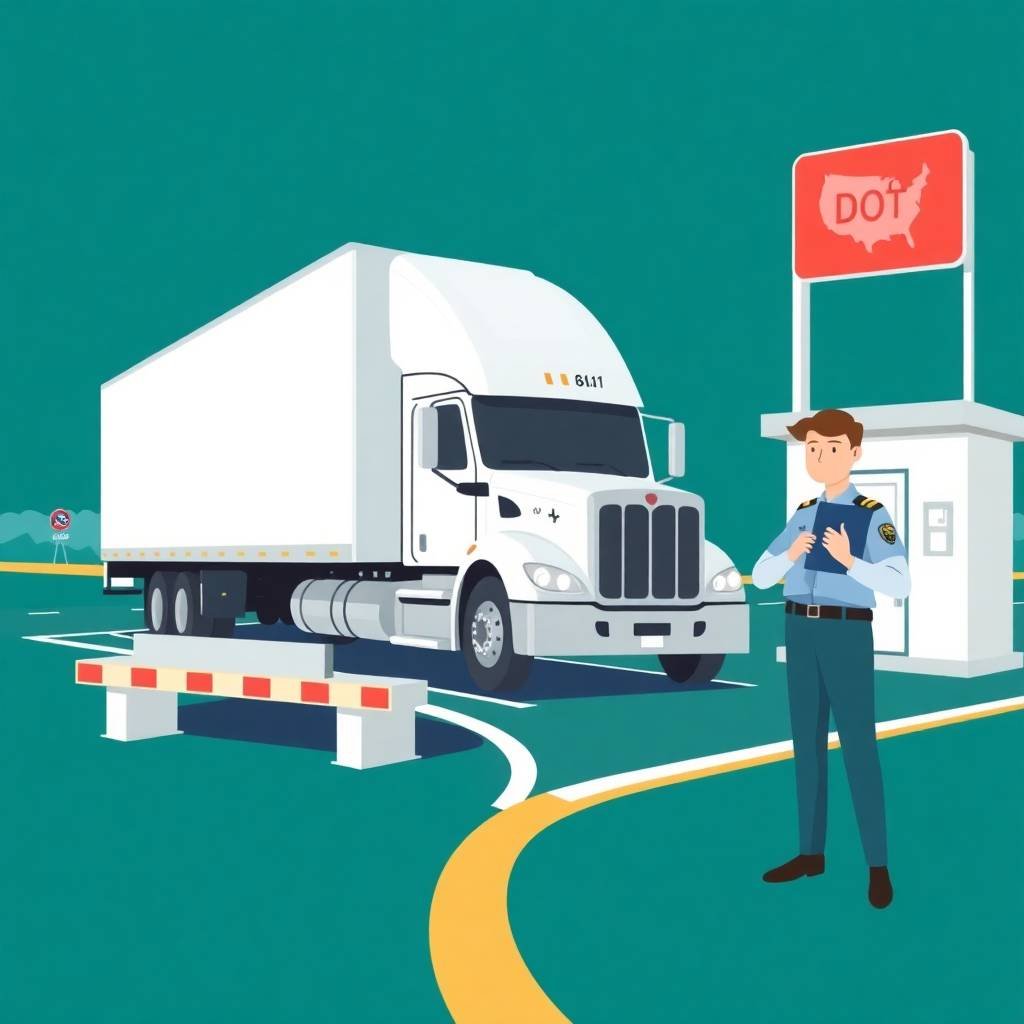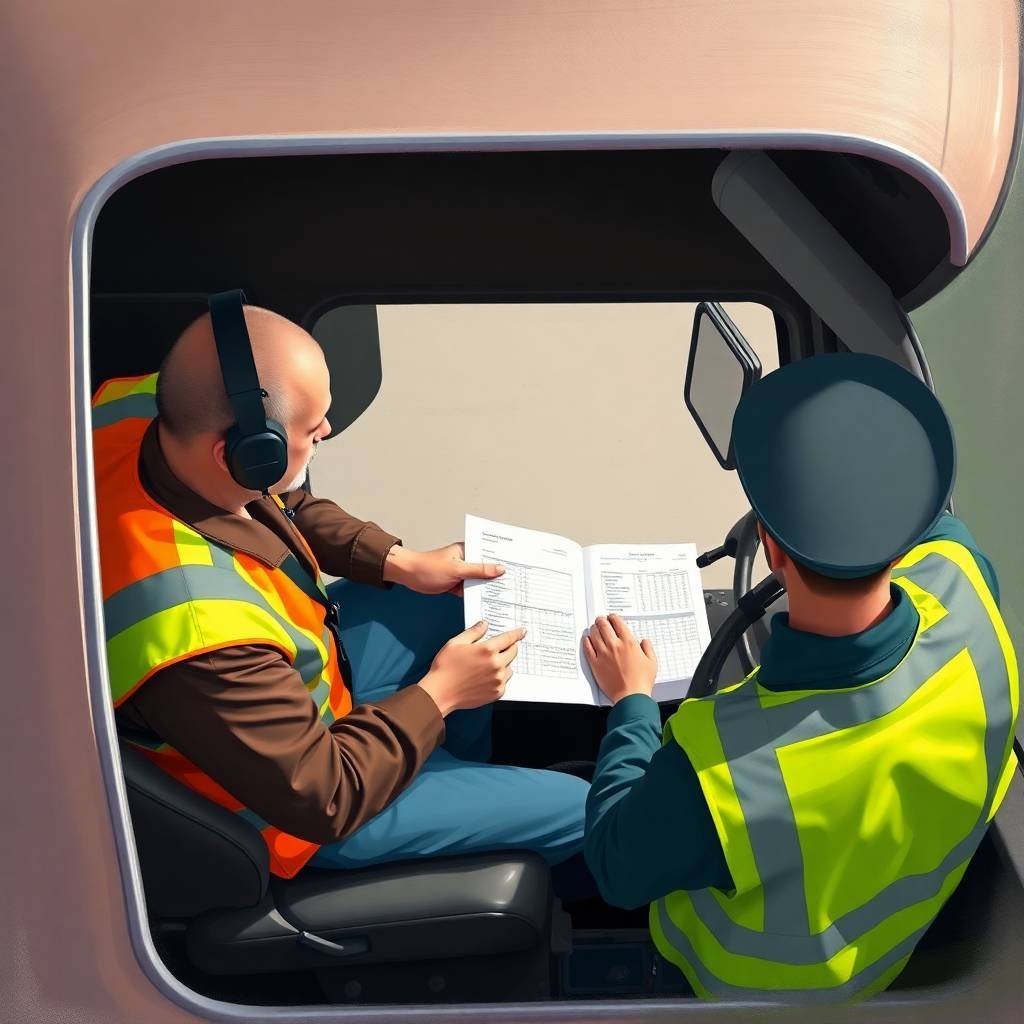1. Understanding FMCSA Hours of Service Exemptions: A Quick Overview
Staying compliant with federal regulations is one of the most critical responsibilities for fleet managers and owner-operators. Among the most discussed topics is FMCSA Hours of Service Exemptions, which can offer flexibility while helping you avoid unnecessary violations and penalties. These exemptions, when applied properly, can significantly enhance operational efficiency without compromising safety.
What Are FMCSA Hours of Service Exemptions?
FMCSA Hours of Service Exemptions refer to specific situations where drivers may be allowed to operate outside the standard Hours of Service (HOS) limits set by the Federal Motor Carrier Safety Administration (FMCSA). These exemptions may apply to short-haul drivers, agriculture-related operations, emergency services, and others under specific conditions.
To navigate these exemptions properly, it’s essential to be well-versed in the DOT compliance checklist and understand the related requirements from both the Department of Transportation and FMCSA.
Types of FMCSA Hours of Service Exemptions
Some common FMCSA Hours of Service Exemptions include:
- Short-haul exemption for drivers operating within a 150 air-mile radius.
- Agricultural exemption during planting and harvest seasons.
- Adverse driving conditions exemption allowing extended driving time.
- Emergency declarations that override standard HOS rules for relief efforts.
To see how these exemptions might apply to your operation, you can explore our comprehensive FMCSA compliance services for owner-operators and compliance help for trucking companies.
Why Proper Documentation Matters
Even when operating under FMCSA Hours of Service Exemptions, fleets must maintain proper documentation. Driver qualification files, pre-employment drug testing records, and logbook exceptions must be accurate and up to date. Our services such as DQ file monitoring, drug and alcohol testing management, and DOT audit preparation are tailored to support this process.
Violations such as those found in DQ file audits or FMCSA compliance mistakes can lead to penalties even if exemptions were valid but poorly documented.
How to Apply Exemptions Without Risk
Applying FMCSA Hours of Service Exemptions requires strategic oversight and accurate data management. Using tools such as our driver safety score management and CSA intervention threshold tracking can help you monitor trends and avoid red flags that may trigger audits.
For those just getting started or undergoing their first audit, new entrant audit preparation and IFTA, IRP, and BOC-3 support offer vital compliance support.
Stay Ahead of FMCSA Rule Changes
With regulations constantly evolving, staying current is essential. Bookmark Truckers Compliance Hub for updates and industry news, including insight into the FMCSA Safety Measurement System 2025. To take proactive steps toward compliance, schedule an appointment with one of our experts.
Conclusion
Understanding FMCSA Hours of Service Exemptions is essential for legal operation, efficiency, and avoiding costly penalties. By leveraging resources like our pre-employment DOT drug testing requirements, random testing program guidance, and clearinghouse compliance insights, you can operate with confidence.
For more information, visit our Terms of Service and Disclaimer, or explore our complete owner-operator compliance checklist.

2. The Agricultural Exemption: Seasonal Advantage with Massive Savings
For agricultural fleets, timing is everything—especially during peak harvest and planting seasons. That’s where the FMCSA Hours of Service Exemptions become a game-changer. Among the most valuable is the agricultural exemption, which offers both operational flexibility and substantial cost savings. When properly understood and applied, this exemption can significantly boost efficiency and compliance for agricultural carriers.
What Is the Agricultural Exemption Under FMCSA?
The FMCSA Hours of Service Exemptions include a specific provision for agriculture-related transportation. This exemption allows drivers transporting agricultural commodities, farm supplies, or equipment within a 150 air-mile radius during planting and harvesting seasons to operate outside the typical Hours of Service (HOS) limits. Full details on these exemptions are available through the FMCSA official site and U.S. Department of Transportation.
Unlike standard HOS regulations, which mandate rest breaks and daily driving limits, the agricultural exemption gives fleet managers the freedom to dispatch drivers based on seasonal demands—without the burden of immediate non-compliance risks.
Maximizing Efficiency During Harvest
Applying the agricultural provision of the FMCSA Hours of Service Exemptions during peak periods enables fleets to run longer routes, make more deliveries, and reduce overtime wage costs. However, maintaining clear and accurate driver records is critical. Make sure your driver qualification files and DOT compliance checklist are in order, and your team understands where the exemption applies geographically and legally.
Failing to align documentation with FMCSA standards—even when using valid exemptions—can lead to DQ file violations or unwanted audit findings. To get prepared, consider our full DOT audit preparation services and review the common FMCSA compliance mistakes that could trip up even seasoned carriers.
Stay Compliant While Saving Big
Even under FMCSA Hours of Service Exemptions, you’re still subject to other key compliance requirements. These include drug and alcohol testing programs, pre-employment testing, and regular random testing. Our drug and alcohol testing management ensures your program is watertight.
It’s also vital to monitor performance via tools like our driver safety score management and understand how the FMCSA Safety Measurement System 2025 could affect your fleet’s compliance profile.
Strategic Support for Agricultural Carriers
Whether you’re navigating CSA intervention thresholds, filing UCR paperwork, or ensuring IFTA and IRP compliance, strategic support can prevent small issues from snowballing into major penalties.
New to FMCSA regulations? Check out our new entrant safety audit tips or schedule a one-on-one consultation with a compliance advisor to make sure you’re applying the FMCSA Hours of Service Exemptions correctly and legally.
Don’t Let Exemptions Lead to Violations
The agricultural exemption, when used correctly, is one of the most financially beneficial FMCSA Hours of Service Exemptions available. But improper use can result in penalties. Review your current practices and correct past issues using our FMCSA violation correction services.
To stay current, visit our blog for the latest compliance news, or explore tailored owner-operator services and general trucking compliance help.
For complete transparency, please review our Terms of Service and Disclaimer.
Understanding and leveraging the agricultural exemption within the FMCSA Hours of Service Exemptions framework can offer your operation a powerful seasonal advantage—if managed correctly.

3. The 100-Air-Mile Radius Rule: Local Drivers’ Legal Shortcut
For local commercial drivers, the FMCSA Hours of Service Exemptions offer strategic advantages that can drastically reduce paperwork and compliance hurdles—if used correctly. Among these, the 100-air-mile radius rule stands out as a powerful, time-saving legal shortcut. Properly applying this exemption can help fleet managers and owner-operators avoid unnecessary logbook requirements and keep their operations both efficient and compliant.
What Is the 100-Air-Mile Radius Rule?
The 100-air-mile exemption under the FMCSA Hours of Service Exemptions applies to drivers who operate within a 100-air-mile radius of their normal work reporting location and return to that location within 12 consecutive hours. When these conditions are met, drivers are not required to maintain a traditional logbook—only a time record showing start and stop times.
This rule, outlined in greater detail on the FMCSA website and the U.S. Department of Transportation, offers a legal and compliant path for local drivers to bypass some of the most burdensome logging requirements.
Who Qualifies and Why It Matters
To qualify for the 100-air-mile exemption, a driver must:
- Operate a vehicle that does not require a Commercial Driver’s License (CDL) or,
- If a CDL is required, not drive more than 11 hours or exceed 12 consecutive hours on duty, and
- Stay within the 100-air-mile radius.
Using this exemption as part of your overall FMCSA Hours of Service Exemptions strategy can prevent violations that often occur due to logbook errors. But qualification isn’t just about mileage—it also requires having well-maintained driver qualification files and an accurate DOT compliance checklist.
For support in setting up or reviewing compliance processes, our DOT audit preparation services and driver safety score management can provide peace of mind and avoid future fines.
Avoiding Costly Mistakes with the Exemption
Misapplying FMCSA Hours of Service Exemptions—even unintentionally—can lead to serious consequences. Inaccuracies can result in DQ file violations, audit findings, or SMS score impacts. Visit our article on FMCSA compliance mistakes for examples to avoid.
Ensuring your business is compliant across the board means also maintaining robust drug and alcohol testing programs and adhering to requirements such as random testing and pre-employment drug screening. These requirements apply regardless of whether a driver qualifies for exemptions.
Get Help Applying the Rule Correctly
Understanding when and how to use the 100-air-mile rule can be complex. To ensure proper implementation, schedule a free consultation with a compliance expert. You can also review our insights on FMCSA compliance requirements for trucking companies or explore specialized compliance help for owner-operators.
Explore additional resources and previous posts at Truckers Compliance Hub for the latest strategies, from managing your CSA thresholds to surviving a new entrant safety audit.
To ensure you’re fully protected, review our Disclaimer and Terms of Service.
By understanding the 100-air-mile exemption and integrating it with other FMCSA Hours of Service Exemptions, local drivers and fleet operators can cut down on administrative burden while remaining fully compliant—ultimately saving time, reducing stress, and preserving your bottom line.

4. Emergency Declaration Exemptions: A Rare but Profitable Opportunity
When disaster strikes or supply chains are threatened, the Federal Motor Carrier Safety Administration (FMCSA) often issues Emergency Declarations to ensure critical goods and services reach their destinations without delay. For carriers and drivers aware of these opportunities, FMCSA Hours of Service Exemptions related to emergency declarations can provide a rare but profitable advantage.
What Are Emergency Declaration Exemptions?
Emergency Declaration Exemptions are temporary waivers issued by the FMCSA under specific circumstances such as natural disasters, pandemics, or other national crises. These waivers allow motor carriers and drivers engaged in direct emergency relief efforts to bypass standard Hours of Service (HOS) regulations. This flexibility can significantly increase delivery capacity and revenue potential.
According to FMCSA.gov and Transportation.gov, these exemptions are tightly regulated and only apply to specific loads, timeframes, and geographic areas. However, when used properly, they’re among the most lucrative FMCSA Hours of Service Exemptions available to fleets and independent operators.
Who Can Benefit from These Exemptions?
Not every driver or load qualifies. Only those directly involved in emergency relief efforts—such as transporting fuel, medical supplies, food, or shelter materials—are covered. Proper driver qualification file documentation and accurate DQ file management are essential for eligibility.
Additionally, these opportunities often arise with little notice. Having your DOT compliance checklist in place ensures you’re ready to respond when emergency waivers are announced.
Compliance Still Matters
While Emergency Declaration Exemptions temporarily lift HOS restrictions, they do not waive other DOT regulations. You must remain compliant with drug and alcohol testing requirements, random DOT testing, and the FMCSA Clearinghouse.
Failure to meet these requirements could still trigger penalties or disqualify your operation from taking advantage of FMCSA Hours of Service Exemptions in the future. Ensure your drug and alcohol testing management is always up to date.
Turn Emergencies Into Opportunity
Carriers that prepare in advance are best positioned to benefit. You can maximize profits by aligning your operations with emergency response needs and maintaining a clean FMCSA safety score. Services like driver safety score management and DOT audit preparation can help you qualify for high-value emergency contracts.
We also recommend exploring our resources for new entrant audit survival tips and how to correct FMCSA violations.
For a customized compliance strategy that keeps your fleet ready for any emergency declaration, schedule your appointment today.
Stay Informed and Stay Compliant
Emergency waivers are fleeting, but preparation creates lasting opportunity. Stay up to date with the latest updates by visiting Truckers Compliance Hub, where you can explore detailed insights like our guide on FMCSA compliance requirements for trucking companies and services tailored for owner-operators.
We also provide full support with IFTA, IRP, and BOC-3 filings, CSA thresholds, UCR filing deadlines, and more.
For further details, please refer to our Disclaimer and Terms of Service.
Understanding and preparing for FMCSA Hours of Service Exemptions, particularly during emergency declarations, can elevate your fleet’s profitability while ensuring full regulatory compliance.

5. Utility Service Vehicle Exemption: Hidden Relief for Specialized Fleets
Many carriers overlook a valuable opportunity hiding in plain sight — the Utility Service Vehicle (USV) exemption. For fleets in specialized sectors such as telecommunications, electric power, water, and sanitation, this exception under the FMCSA Hours of Service Exemptions can significantly ease regulatory pressure while increasing productivity.
What Is the Utility Service Vehicle Exemption?
The Utility Service Vehicle exemption falls under the broader umbrella of FMCSA Hours of Service Exemptions, allowing specific vehicles to bypass standard hours-of-service (HOS) regulations. According to the FMCSA, a USV is any vehicle used to repair, maintain, or serve public utility infrastructure — often during emergency conditions or in remote locations. This exemption permits drivers to operate beyond normal HOS limitations without violating federal rules, as long as the vehicle’s use aligns with the legal definition of utility service work.
Benefits of the USV Exemption
The most significant advantage of this exemption is operational flexibility. Unlike typical commercial drivers who must adhere to strict driving limits and mandatory breaks, utility service drivers can extend their hours to complete vital repairs or infrastructure work. This flexibility can be especially crucial during storms, power outages, or when crews are dispatched to underserved regions.
Moreover, utilizing these FMCSA Hours of Service Exemptions can reduce downtime, improve service continuity, and enhance profitability — especially when paired with a robust DOT compliance checklist and a well-maintained driver qualification file.
Remain Vigilant with Other Compliance Areas
While the USV exemption relaxes HOS rules, it doesn’t eliminate other FMCSA mandates. You must still maintain adherence to requirements for drug and alcohol testing compliance, pre-employment screening, random testing, and FMCSA Clearinghouse compliance.
To remain fully compliant while benefiting from the exemption, take advantage of services like drug and alcohol testing management and driver safety score management.
How to Qualify and Prepare
If your fleet supports utility operations, you may already qualify for this hidden relief. But proper documentation is critical. Avoid costly DQ file violations and compliance mistakes by working with experts who understand how to correct FMCSA violations and manage new entrant audit survival.
You can schedule a one-on-one appointment to get tailored support and ensure your operations qualify for this and other FMCSA Hours of Service Exemptions.
Access Strategic Compliance Support
Whether you’re looking to maintain your UCR filing deadlines, navigate CSA intervention thresholds, or handle IFTA, IRP, and BOC-3 requirements, we’ve got you covered. Our team at Truckers Compliance Hub provides targeted solutions, including DOT audit preparation and a compliance checklist for owner-operators.
Explore more valuable insights through our in-depth articles on FMCSA compliance help for trucking companies, owner-operator services, and tips for avoiding FMCSA compliance mistakes.
For full legal details, be sure to review our Disclaimer and Terms of Service.
Unlock the Benefits Today
The Utility Service Vehicle exemption is a rarely used but legally powerful provision under the FMCSA Hours of Service Exemptions. If you operate in the utility sector, this could be the hidden relief your fleet needs. Don’t miss out — get prepared and get ahead.

6. Oilfield Operations Exemption: Unlocking Niche Compliance Benefits
The oil and gas sector operates on unique demands, timelines, and terrain. Recognizing these specific needs, the Federal Motor Carrier Safety Administration (FMCSA) offers a powerful but often underutilized tool — the Oilfield Operations Exemption. This provision falls under the broader category of FMCSA Hours of Service Exemptions, offering operational relief that can translate to increased efficiency and profitability for carriers supporting energy exploration and production.
What Is the Oilfield Operations Exemption?
The Oilfield Operations Exemption is a tailored FMCSA Hours of Service Exemption that applies specifically to drivers supporting oil and natural gas operations. Unlike general trucking rules, this exemption permits additional flexibility regarding required rest breaks, off-duty time, and restart periods. According to the FMCSA, drivers who operate specially designed oilfield equipment — such as frac tanks or sand delivery units — and are provided with adequate sleeping facilities may record certain waiting periods as off-duty, extending available drive time.
This exemption is part of a suite of FMCSA Hours of Service Exemptions designed to match regulations with the operational reality of various industries, especially high-demand sectors like energy and infrastructure.
Strategic Compliance Opportunities
Leveraging this exemption correctly can be a game-changer. By treating appropriate waiting times as off-duty, oilfield carriers can reduce driver fatigue violations, extend service hours, and optimize job site turnaround. However, it’s crucial to align this with broader regulatory compliance efforts, including maintaining a complete driver qualification file, following drug and alcohol testing protocols, and avoiding DQ file violations.
Our DOT compliance checklist and audit preparation services can help ensure your oilfield operation stays within FMCSA guidelines while maximizing every available exemption.
Oilfield Fleet Risk Management
Oilfield carriers must remain vigilant. Despite the exemption, other key compliance areas must remain tightly managed — including FMCSA Clearinghouse compliance, pre-employment drug testing, random testing protocols, and driver drug and alcohol testing programs.
We recommend working with compliance experts to develop customized strategies for your oilfield fleet. Whether it’s drug and alcohol testing management, driver safety score management, or handling CSA intervention thresholds, every aspect counts toward long-term success.
Tools to Navigate Oilfield Compliance
Truckers in the energy sector benefit from having access to accurate, timely, and personalized compliance support. Our team offers services that cover everything from IFTA, IRP, and BOC-3 filings to UCR deadlines and FMCSA compliance for trucking companies. Additionally, we provide tailored resources for new entrants and owner-operators.
To ensure your oilfield operation takes full advantage of FMCSA Hours of Service Exemptions, schedule a consultation with our compliance professionals today. You can also browse our comprehensive blog for ongoing updates.
Stay Legally Covered
Before applying exemptions, it’s important to review our Disclaimer and Terms of Service to understand the legal considerations that apply to your fleet. For broader government guidance, refer to the U.S. Department of Transportation and the official FMCSA site.
Conclusion
The Oilfield Operations Exemption offers a rare opportunity to align regulatory requirements with the unique demands of the energy industry. By mastering this and other FMCSA Hours of Service Exemptions, specialized fleets can gain a competitive edge — but only if they combine exemption use with sound compliance practices. Let Truckers Compliance Hub help you unlock the full value of your operation.

7. Custom Harvesters Exemption: A Loophole Designed for Agricultural Contractors
For agricultural haulers and custom harvesters, navigating federal transportation laws can be daunting. However, a specialized relief within the FMCSA Hours of Service Exemptions offers a unique advantage: the Custom Harvesters Exemption. This provision is tailored specifically to the needs of seasonal farming contractors who perform crop harvesting across state lines — and when used strategically, it can dramatically reduce regulatory friction and boost operational flexibility.
What Is the Custom Harvesters Exemption?
The Custom Harvesters Exemption is one of several FMCSA Hours of Service Exemptions that provides tailored relief for agricultural carriers. It allows qualified drivers transporting equipment or crops for harvest to bypass certain Hours of Service (HOS) regulations during planting and harvesting seasons. According to the FMCSA, this exemption can apply within a 150-air-mile radius of the source and is tied to the broader agricultural commodity exemption.
This exemption is not just a loophole — it’s a legally authorized pathway designed to help the agricultural industry meet peak seasonal demands without compromising safety.
Benefits and Practical Use Cases
Custom harvesting operations involve the use of heavy, specialized equipment and require timely, efficient transport between farms, often spanning multiple states. The FMCSA Hours of Service Exemptions allow drivers in these operations to stay on the road longer without violating HOS limits. For example, the exemption may reduce the need for driver qualification file updates and lessen the frequency of DQ file violations.
However, proper documentation and compliance strategies are still essential. A solid DOT compliance checklist and audit preparation plan are critical to staying exempt while remaining legally compliant.
How to Leverage This Exemption Correctly
To qualify, operations must meet specific criteria under federal guidelines. Partnering with compliance experts can simplify the process. At Truckers Compliance Hub, we assist agricultural carriers in determining eligibility, preparing necessary documentation, and avoiding common FMCSA compliance mistakes.
Moreover, custom harvesters often operate under time-sensitive conditions, making it vital to manage drug and alcohol testing programs, adhere to Clearinghouse compliance rules, and maintain CSA safety measurement standards. We also offer tools to manage driver safety scores and ensure timely UCR filings.
Specialized Compliance Support
From owner-operators to large ag fleets, Truckers Compliance Hub provides tailored services including drug and alcohol testing management, CSA intervention support, IFTA, IRP, and BOC-3 filings, and new entrant audit help. If you’re unsure whether your operation qualifies, schedule a personalized consultation today.
Stay Informed and Protected
Our terms of service and disclaimer provide transparency and protection as you explore your exemption eligibility. For updates and more expert insights, visit our main blog or explore in-depth FMCSA compliance help.
Conclusion
The Custom Harvesters Exemption is one of the most impactful FMCSA Hours of Service Exemptions available to agricultural haulers. While it offers immense flexibility, proper compliance remains essential. With professional guidance and a thorough understanding of your regulatory responsibilities, this exemption can become a strategic advantage for your farming operation.

What are FMCSA Hours of Service Exemptions and who qualifies for them?

FMCSA Hours of Service Exemptions are specific rules that allow qualifying drivers to operate outside the normal HOS regulations under certain conditions. These exemptions may apply to short-haul drivers, agricultural haulers, emergency responders, and oilfield service operators, among others. Understanding who qualifies is critical to maintaining compliance and avoiding penalties. To help determine your eligibility and prepare supporting documentation, you can rely on expert support like our DOT audit preparation services, which guide fleets through FMCSA compliance requirements effectively.
How can short-haul drivers benefit from FMCSA Hours of Service Exemptions?

Short-haul drivers operating within a 100-air-mile radius may be exempt from maintaining daily logs if they meet specific criteria, such as returning to the same work reporting location within 12 hours. This FMCSA Hours of Service Exemption can simplify operations and reduce administrative overhead. To stay compliant while leveraging this exemption, it’s smart to implement DQ file setup and monitoring to ensure all required driver qualification records are properly maintained.
Can FMCSA Hours of Service Exemptions be used during emergencies?

es, the FMCSA can issue temporary HOS exemptions during declared emergencies, such as natural disasters or public health crises. Fleets providing direct relief during these times can legally bypass certain HOS requirements. However, maintaining proper compliance infrastructure is essential before and after the exemption period. Services like UCR filing assistance ensure your fleet remains in good standing year-round—even when operating under exemptions.
What documentation is required to support FMCSA Hours of Service Exemptions?

Documentation depends on the exemption type but may include time records, dispatch logs, or proof of the operational classification (e.g., agricultural or utility service). Maintaining up-to-date compliance records is essential. Many fleets rely on solutions like our IFTA, IRP, and BOC-3 support to stay organized and ensure that their use of FMCSA Hours of Service Exemptions is always backed by proper paperwork.
How do FMCSA Hours of Service Exemptions affect drug and alcohol testing requirements?

FMCSA Hours of Service Exemptions do not eliminate the requirement for drug and alcohol testing. All safety-sensitive drivers must remain enrolled in a compliant program, regardless of HOS exemptions. To stay aligned with federal mandates while leveraging these exemptions, fleets can use drug and alcohol testing management services that streamline compliance and reduce risk.
Igor Iturriaga is a transportation compliance expert and founder of Dynamic 305 Miami LLC. He helps owner-operators and fleets stay FMCSA-compliant and audit-ready. https://www.linkedin.com/in/igor-iturriaga-64503217/
